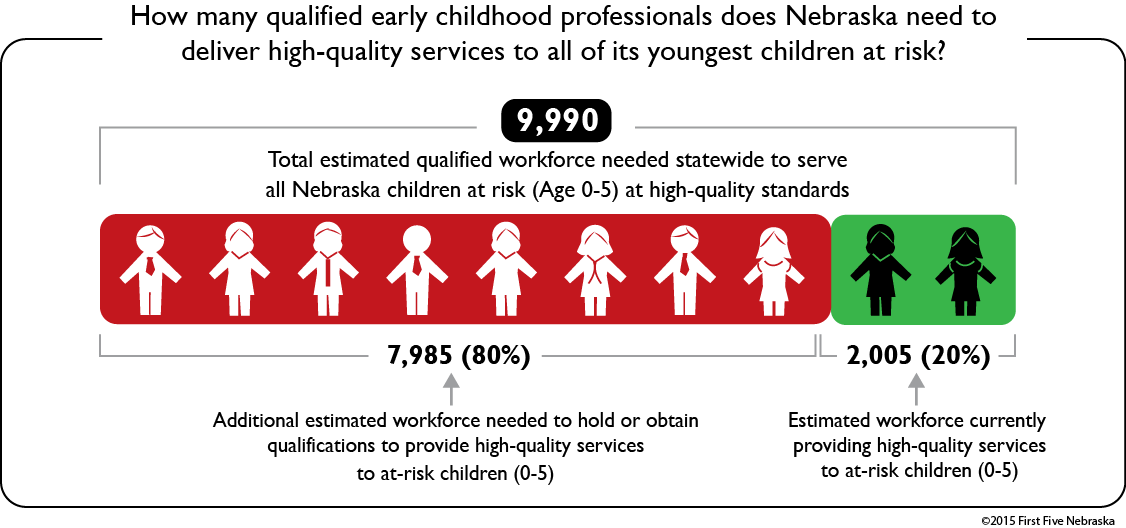 Last week in Lincoln, more than 120 people from higher education institutions, the Nebraska Department of Education, Nebraska Department of Health and Human Services and other agencies gathered with national consultants to discuss strategies to ensure that all at-risk children are served by high-quality early childhood educators. The conference, “Transforming the Early Childhood Workforce in Nebraska,” was planned and hosted by the Buffett Early Childhood Institute at the University of Nebraska.
Last week in Lincoln, more than 120 people from higher education institutions, the Nebraska Department of Education, Nebraska Department of Health and Human Services and other agencies gathered with national consultants to discuss strategies to ensure that all at-risk children are served by high-quality early childhood educators. The conference, “Transforming the Early Childhood Workforce in Nebraska,” was planned and hosted by the Buffett Early Childhood Institute at the University of Nebraska.
As the Director of Workforce Planning and Development at the Buffett Institute, I was thrilled that early childhood experts and leaders from across Nebraska—including 22 of the state’s 24 higher education institutions—were willing to commit two days of time and energy to statewide conversation about a critical need. Like most states, Nebraska faces a serious shortage of highly qualified early childhood educators. To meet current demand, First Five Nebraska estimates the state needs more than 7,900 highly qualified early childhood professionals to serve the growing population of vulnerable young children.

Building Consensus
We convened this conference to discuss several recent reports on higher education and the workforce and to start building a consensus on the best options for Nebraska. One national report was issued by the Institute of Medicine and the National Research Council; the other focused on Nebraska’s higher education programs that prepare the early childhood workforce. Both of these reports were examined during conference presentations and working group sessions designed for participants to provide feedback on specific recommendations.
- “Transforming the Workforce for Children Birth Through Age 8: A Unifying Foundation,” by the Institute of Medicine and the National Research Council, offers guidance for systems change to improve professional learning and workforce development for early childhood professionals.
- The “Nebraska Higher Education Inventory,” conducted by the Center for the Study of Child Care Employment at the University of California, Berkeley, in conjunction with the Buffett Early Childhood Institute, provides the most complete picture to date of the state’s early childhood-related offerings and degree programs, focusing on variations in program content, age-group focus, student field-based learning, and faculty characteristics.
Immediately following the conference, deans from the University of Nebraska Omaha, University of Nebraska–Lincoln, and University of Nebraska at Kearney, senior University of Nebraska faculty, First Five Nebraska and Nebraska Department of Education personnel met in a facilitated think tank to discuss specific action steps. Two more think tanks will follow soon, bringing together early childhood leaders from community colleges, state colleges, and private four-year institutions across Nebraska. These think tanks will help form the basis for other initiatives within the Buffett Institute’s workforce program.
Three Pressing Needs
Based on state and national reports, we see three pressing needs for Nebraska. First and foremost, we have a shortage of highly qualified early childhood educators, particularly for infant/toddler classrooms and English language learners. This need is well-documented within the state (and across the nation). Second, Nebraska’s system of licensing, certification and higher educational preparation is fragmented and poses barriers to increasing the number of highly qualified early childhood educators. We have many people, systems and institutions invested in helping children and families, yet the lack of communication and common goals creates unnecessary barriers to the current and future workforce. And finally, early childhood educators in Nebraska and across the nation do not have a cohesive, publicly recognized and valued professional identity. As a field, early childhood educators must define who is highly qualified and help create a professional identity that leads to public commitment for early childhood funding.
Convenings such as this are critical to establishing a common vision across the state for early childhood educators and creating an integrated system. At the Buffett Early Childhood Institute, we are committed to working with you to cross boundaries and create supportive professional environments for highly qualified early childhood educators for every at-risk child.
Dr. Susan Sarver
Director of Workforce Planning and Development, Buffett Early Childhood Institute


